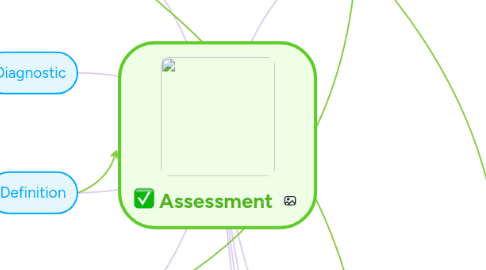
1. Summative
1.1. Review what you want to do
1.1.1. Standardized Testing
1.1.2. Final Exams
1.1.3. Major Cumulative Projects
1.1.4. Research Projects
2. Diagnostic
2.1. Pre-assessments that provide teachers with information about students prior knowledge and misconceptions before beginning the learning activity.
2.1.1. Graphic Organizers
2.1.2. KWL
2.1.3. Pre-test
3. Definition
3.1. Helps students learn
3.2. Helps teacher to improve instruction
3.3. Analyzes and uses data to make decisions about teaching strategies and student
4. Performance
4.1. Measures students based on authentic tasks such as activities, exercises or problems that require students to show what they can do.
4.1.1. Student logs
4.1.2. Journals
4.1.3. Individual Projects
4.1.4. Portfolios
5. Formative
5.1. Informal Formative Assessment
5.1.1. Spontaneous
5.1.2. Immediate Feedback
5.1.3. Observation
5.1.4. Diagnostic
5.2. Formative Assessment Characteristics
5.2.1. Evidence of Student Learning
5.2.2. Structure
5.2.3. Instruction Adjustment
5.2.4. Participant Involved Feedback
5.3. Formative Assessment Cycle
5.3.1. Gather Evidence of Learning
5.3.2. Evaluate Evidence
5.3.3. Feedback
5.3.3.1. Goal Directed
5.3.3.2. Scaffolded
5.3.3.3. Self-Referenced
5.3.3.4. Standard-Referenced
5.3.3.5. Norm-Referenced
5.3.4. Adjust Instruction
5.4. Formal Formative Assessment
5.4.1. Planned Activity
5.4.2. Pre-Assessment
5.4.3. 6 Types of Formal Formative
5.4.3.1. Structure Exercises
5.4.3.2. Pretests
5.4.3.3. Homework
5.4.3.4. Quizzes and Unit Test
5.4.3.5. Classroom Response System
5.4.3.6. In Class Assignment
6. Interim/Benchmark
6.1. Testing Throughout the School Year
6.1.1. Every 6 weeks Chapter Test
6.1.2. Chapter Test
